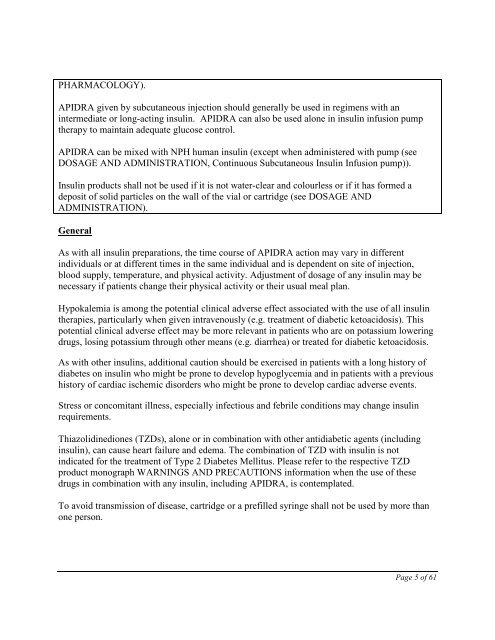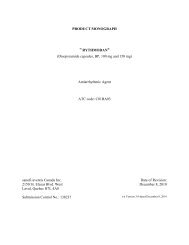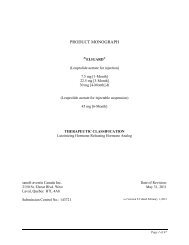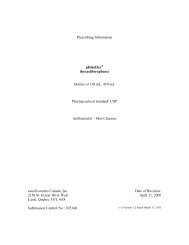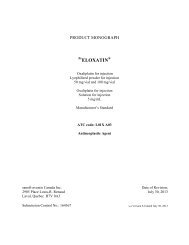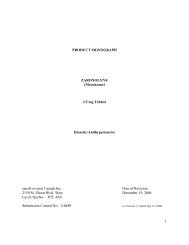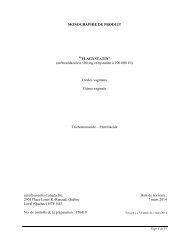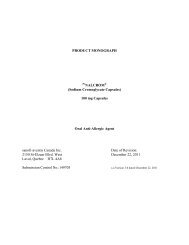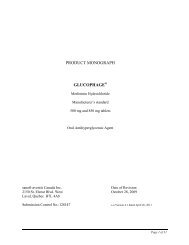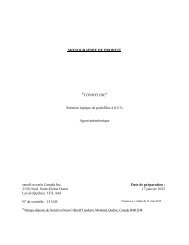Apidra (insulin glulisine) - Sanofi Canada
Apidra (insulin glulisine) - Sanofi Canada
Apidra (insulin glulisine) - Sanofi Canada
You also want an ePaper? Increase the reach of your titles
YUMPU automatically turns print PDFs into web optimized ePapers that Google loves.
PHARMACOLOGY).<br />
APIDRA given by subcutaneous injection should generally be used in regimens with an<br />
intermediate or long-acting <strong>insulin</strong>. APIDRA can also be used alone in <strong>insulin</strong> infusion pump<br />
therapy to maintain adequate glucose control.<br />
APIDRA can be mixed with NPH human <strong>insulin</strong> (except when administered with pump (see<br />
DOSAGE AND ADMINISTRATION, Continuous Subcutaneous Insulin Infusion pump)).<br />
Insulin products shall not be used if it is not water-clear and colourless or if it has formed a<br />
deposit of solid particles on the wall of the vial or cartridge (see DOSAGE AND<br />
ADMINISTRATION).<br />
General<br />
As with all <strong>insulin</strong> preparations, the time course of APIDRA action may vary in different<br />
individuals or at different times in the same individual and is dependent on site of injection,<br />
blood supply, temperature, and physical activity. Adjustment of dosage of any <strong>insulin</strong> may be<br />
necessary if patients change their physical activity or their usual meal plan.<br />
Hypokalemia is among the potential clinical adverse effect associated with the use of all <strong>insulin</strong><br />
therapies, particularly when given intravenously (e.g. treatment of diabetic ketoacidosis). This<br />
potential clinical adverse effect may be more relevant in patients who are on potassium lowering<br />
drugs, losing potassium through other means (e.g. diarrhea) or treated for diabetic ketoacidosis.<br />
As with other <strong>insulin</strong>s, additional caution should be exercised in patients with a long history of<br />
diabetes on <strong>insulin</strong> who might be prone to develop hypoglycemia and in patients with a previous<br />
history of cardiac ischemic disorders who might be prone to develop cardiac adverse events.<br />
Stress or concomitant illness, especially infectious and febrile conditions may change <strong>insulin</strong><br />
requirements.<br />
Thiazolidinediones (TZDs), alone or in combination with other antidiabetic agents (including<br />
<strong>insulin</strong>), can cause heart failure and edema. The combination of TZD with <strong>insulin</strong> is not<br />
indicated for the treatment of Type 2 Diabetes Mellitus. Please refer to the respective TZD<br />
product monograph WARNINGS AND PRECAUTIONS information when the use of these<br />
drugs in combination with any <strong>insulin</strong>, including APIDRA, is contemplated.<br />
To avoid transmission of disease, cartridge or a prefilled syringe shall not be used by more than<br />
one person.<br />
Page 5 of 61


